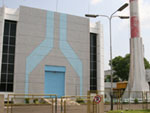MENU

|
| FNCA 2001 Workshop
on Nuclear Safety Culture |
 Summary Summary
| 1) Date : |
September 10-14, 2001 |
| 2) Place : |
Tokyo, Japan |
| 3) Sponsored by : |
Australian Nuclear Science and Technology Organisation (ANSTO)
Ministry of Education, Culture, Sports, Science and Technology
(MEXT) |
| 4) In Cooperation with : |
Japan Atomic Industrial Forum, Inc. (JAIF) |
| 5) Attendance : |
26 participants from Australia (3), China (1), Indonesia (2),
Japan (15),
Korea (1), Malaysia (1), The Philippines (1), Thailand (1), Viet Nam (1) |
 Reports
and Discussions Reports
and Discussions
1)The Main Topics of the Workshop
| |
a) |
Reporting against the 6 safety culture activity indicators |
| |
b) |
Reporting training courses in safety culture |
| |
c) |
Reporting against the Nuclear Safety Convention Articles |
| |
d) |
Working groups on organizational factors, training, publicity
and peer reviews |
| |
e) |
Lessons learned from the accidents at TMI and the source accident
in Thailand |
| |
f) |
Discussion on future activities |
2) Outcomes
| |
a) |
Visits to JAERI and Hamaoka nuclear power plant provided
insights on ways of implementing safety culture. |
| |
b) |
Web site, developed by Australia, was considered a
useful way to exchange information and countries were
requested to provide links to their own web sites, when
available. |
| |
c) |
Progress had occurred in safety culture implementation
and development of new initiatives from the last workshop
in the reports against the indicators. |
| |
d) |
The 11 benchmarks were considered to be important in
assessing the level of implementation of safety culture
in an organization. All countries agreed to report against
these benchmarks at the next workshop. |
| |
e) |
Those countries that had not yet done so were encouraged
to report against the indicators for a typical research
reactor. |
| |
f) |
The workshop recognized that complacency and too rigid
or unthinking adherence to rules could lead to a situation
where safety culture might decline. Every country was
urged to consider what mechanisms it might put in place
to identify and arrest any signs of decline. |
| |
g) |
Several countries had indicated the importance of having
systems for learning from experience. In Japan, direct
benefit was received from applying lessons learned after
the TMI accident. |
3) Future Activities
| |
a) |
The participants agreed to publish the outcomes and findings
of the safety culture workshops in a booklet. Australia undertook
to produce a draft by February 2002. The workshop recommended
that FNCA Coordinators considered the publication of this booklet
in the languages of the member countries. |
| |
b) |
The workshop recommended a peer review process to foster safety
culture in research reactors by identifying good practices and
areas for improvement. Australia and Japan undertook to produce
a draft report for peer review by the end of January 2002. The
workshop further recommended that this topic and possible follow-up
visits to specific reactors should be discussed by the FNCA Coordinators. |
| |
c) |
The next workshop should be held in Viet Nam or Korea to allow
more people from that country to participate in the workshop. |
 |
| Participants in the 2001 Workshop |
|
|
page top↑ |